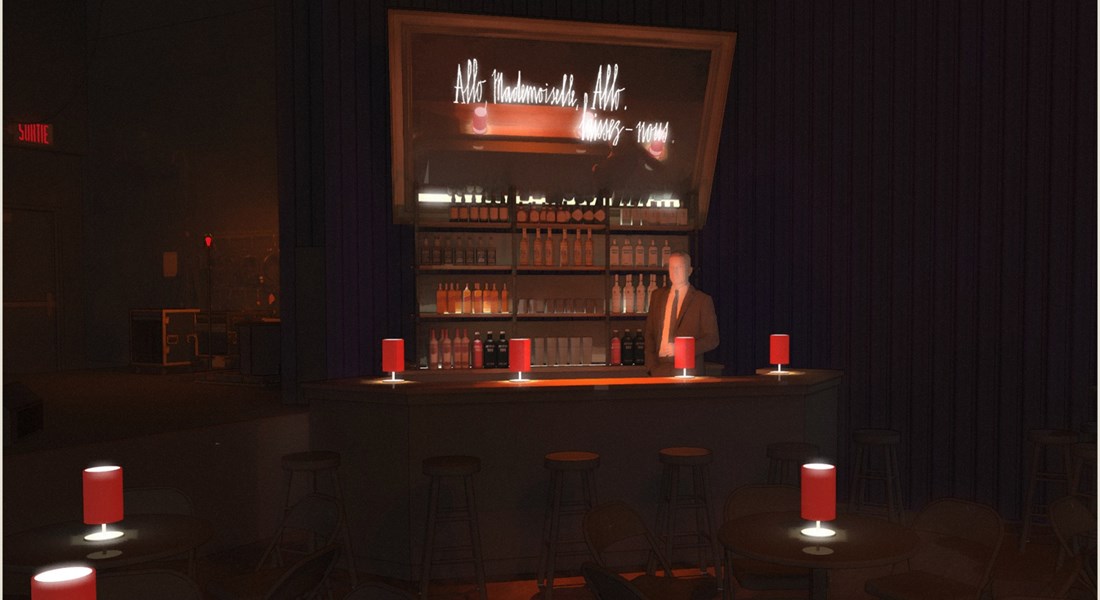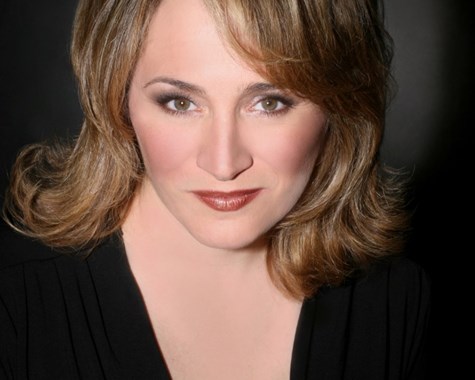Posted7 Sep 2018
- In
A Super-Human Freak Show
James Darrah is no stranger to Francis Poulenc’s La voix humaine, the French composer’s 1958 monodrama based on Jean Cocteau’s play of the same name.
The Los Angeles-based artist previously directed the one-woman tour-de-force for Opera San Antonio in the intimacy of a small theater, substituting a lone pianist for the full orchestra.
It is then not surprising that he is once again at the helm of staging Poulenc’s psychological drama, sung by soprano Patricia Racette, sans proscenium and sans orchestra for Opera Philadelphia’s Festival O18. Those choices of diminished scale have marked productions around the world.

But this time Darrah, who is known for his pioneering, unconventional body of work, embraced a fresh challenge, a new element of risk. He decided to include a prologue to the opera, which chronicles the devastating phone conversation of a woman desperate to win back a former lover who has moved on. He is also producing an art film adaptation of this tragic operatic monologue.
“I always had an interest in what opera could do in a film that hasn’t been done,” says Darrah, who directed Opera Philadelphia’s acclaimed world premiere Breaking the Waves in 2016. “I think opera is a very strange thing to film in general. At its heart, it’s a super-human freak show. You’re watching people breathe in, use that full breath and sing very loud, often very intense, hyper-theatrical — sometimes still very human — things.
“Filming that isn’t very interesting to me because you have to find a way to film it so the theatricality of it makes sense. And that’s hard to do, which is why it tends to be done as a documentary.”
Darrah had no interest in treading such familiar ground. With La voix humaine, reimagined for Festival O18 as Ne Quittez Pas, he is instead delivering two distinctive productions — a live staging of the opera and a film that will be shot independently, with the potential to launch an entire sub-genre of independent films.

“I thought, if we film this as an art film, experimentally and psychologically, there are things we can’t do with a live performance,” he says. “The use of a camera and cinematography opens up a whole bunch of possibilities to tell the story in a really cool way.”
Ne Quittez Pas, which is being staged and filmed at The Theatre of Living Arts, a former movie house turned concert venue, is a work of raw immediacy and voyeuristic intimacy. One of its great challenges — indeed the challenge of any La voix production — is inviting the audience into the drama of a phone conversation from a single perspective, as the protagonist’s ex-lover is never heard.
Darrah’s introduction of a prologue not only stretches the one-act opera, frequently staged as a companion piece, into a full evening, it gives some insight into the gentleman on the other end of the phone. That cabaret performance will feature baritone Edward Nelson drawing from Poulenc’s art song catalog, as well as the poetry of Apollinaire.
The opera is set in a Paris nightclub circa 1980, the era allowing for the prominence of the telephone and the space for the stark piano rendering of Poulenc’s alternatingly tense and lyrical score. The paring down honors the opera’s origins, as Poulenc did write a version for piano before treating the work to a full orchestration.
“The score is very much aligned to interior thought, where the music leads you on a journey. It’s not descriptive. It immerses you in this world and it’s a really fast, fun ride,” says Darrah. “We were never going to get a full orchestra in such a small venue. Since the piece is just about the human voice, isn’t it much more poetic then that musically there’s a solo voice?
For the multifaceted director and designer, Ne Quittez Pas is ultimately a character-driven piece, and any decision made in its staging and filming should serve the story and its protagonist, whose seeming self-possession, and at times even exuberance, eventually unravels into desperation and despair.
“On paper, La voix looks so simple, but what the character goes through is so incredibly intense and visceral and really potent in terms of its humanity. It is an emotionally exhaustive opera,” says Darrah, who is thrilled to have Racette, both a consummate artist and powerful actor, singing the role of Elle.

He is also excited to be working with a creative team equally invested in the storytelling.
“James is a minimalist but not just for minimalism’s sake,” says lighting designer Pablo Santiago, a frequent collaborator of Darrah’s. “It’s about stripping everything down to the essence of the story. This story is not just the plot. It’s ‘This is sadness, this is envy, this is jealousy as a self-fulfilling spiral.’
“How do we show that with design? How do I investigate that with light?”
For celebrated costume designer Chrisi Karvonides, who worked with Darrah and Santiago on Breaking the Waves, the minimalist scenery means the costumes have to tell the visual story. Darrah, she says, not only strives to get to the essence of a character, he is also continually looking for ways to enhance the story through the drama of each costume.
Though the shift to film will require some technical adjustments, many elements of the opera will remain the same onscreen.
“There is not a way to design the film without designing the opera,” says production designer Tony Fanning. “Ideally it would be great if they were one and the same but also exciting if the visual identity differed but accomplished the same thing — conveying the emotional impact of the piece fully to either audience.”
Fanning, whose production credits include Lemony Snicket’s A Series of Unfortunate Events, Amistad and Straw Dogs, envisions an eventual double bill, or simultaneous run, of the live performance and film.
Darrah does have ambitious hopes for its release but is mindful that his experiment not compromise the haunting enigma and universal humanity of Poulenc’s opera.
“We’re actually celebrating it and maybe deepening it and creating an experience that feels complementary to it because it’s pretty perfect,” he says.
Naila Francis is a writer and editor based in Philadelphia
Leave your comment below.

 Facebook
Facebook Twitter
Twitter More
More